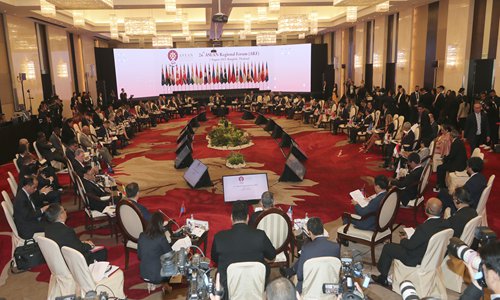Niggles don’t bruise China-ASEAN ties

Photo: IC
The 52nd Association of Southeast Asian Nations (ASEAN) Foreign Ministers' Meeting and related meetings were held in Bangkok, Thailand, from July 29 to August 3. Chinese State Councilor and Foreign Minister Wang Yi attended a string of these meetings, such as the ASEAN Plus Three Foreign Ministers' Meeting, East Asia Summit Foreign Ministers' Meeting, and ASEAN Regional Forum, vowing to enhance cooperation with ASEAN.
The relationship between China and ASEAN has a solid foundation, but it also faces challenges.
ASEAN is the priority of China's neighborhood diplomacy as well as the China-proposed Belt and Road Initiative. With joint efforts, China-ASEAN ties have set a model for regional cooperation. In an article entitled "ASEAN-China: New stage of development," published in The Jakarta Post on July 30, Chinese Ambassador to ASEAN Huang Xilian shone the light on China-ASEAN relations: The pathway to the development of China-ASEAN relations is clearer; their strategic mutual trust is deeper; economic and trade cooperation is growing faster; people-to-people ties are closer and China-ASEAN engagement in the region and beyond is broader.
At the ASEAN summit held in Thailand in June, leaders of ASEAN members articulated their support to conclude negotiations for the Regional Comprehensive Economic Partnership (RCEP) by the end of 2019. In recent years, concepts of unilateralism and multilateralism, globalization and anti-globalization are being fiercely debated across the world. Once relevant negotiations are concluded, the RCEP will give an important boost to regional and multilateral cooperation in Asia.
The Jakarta Post reported that China and ASEAN members just completed a first reading of Single Draft Negotiating Text of the Code of Conduct (COC) on the South China Sea. It shows COC negotiations are going smoothly.
The path of COC negotiations is filled with ups and downs, but its prospects are clear. All relevant parties need to strengthen mutual trust and adopt flexible approaches so as to ultimately reach consensus.
Some countries outside the region are making indiscreet remarks about the COC talks, and are steadily increasing their military presence in this region. These will disturb the COC negotiations. China and ASEAN members need to be vigilant about it.
The intervention of US-led external powers in the South China Sea has been growing. The US-launched Indo-Pacific Strategy mainly aims at curbing China's clout in the South China Sea under the pretext of so-called freedom of navigation.
A fresh round of China-Vietnam tensions on Vanguard Bank, Nansha Islands, has been simmering in recent weeks, which can to some extent affect China-ASEAN ties.
The biggest challenge for China-ASEAN ties is a lack of mutual trust on security affairs. There are some territorial disputes between China and certain ASEAN members. The intervention of some countries outside the region has deepened such mistrust. However, security and political cooperation is the foundation of economic collaboration. The mistrust in security will negatively influence China-ASEAN economic cooperation.
In the future, China and ASEAN should take economic cooperation as the strategic focal point. They should enhance the quality of joint projects so as to let ordinary people in ASEAN know better about China's development while trying to eliminate their negative image of China.
The author is a research fellow with the National Institute of International Strategy at the Chinese Academy of Social Sciences. opinion@globaltimes.com.cn
